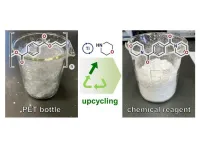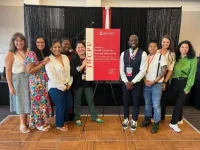(Press-News.org) A loving bond between parents and their children early in life significantly increases the child’s tendency to be ‘prosocial’, and act with kindness and empathy towards others, research indicates.
The University of Cambridge study used data from more than 10,000 people born between 2000 and 2002 to understand the long-term interplay between our early relationships with our parents, prosociality and mental health. It is one of the first studies to look at how these characteristics interact over a long period spanning childhood and adolescence.
The researchers found that people who experienced warm and loving relationships with their parents at age three not only tended to have fewer mental health problems during early childhood and adolescence, but also displayed heightened ‘prosocial’ tendencies. This refers to socially-desirable behaviours intended to benefit others, such as kindness, empathy, helpfulness, generosity and volunteering.
Although the correlation between parent-child relationships and later prosociality needs to be verified through further research, the study points to a sizeable association. On average, it found that for every standard unit above ‘normal’ levels that a child’s closeness with their parents was higher at age three, their prosociality increased by 0.24 of a standard unit by adolescence.
Conversely, children whose early parental relationships were emotionally strained or abusive were less likely to develop prosocial habits over time. The researchers suggest this strengthens the case for developing targeted policies and support for young families within which establishing close parent-child relationships may not always be straightforward; for example, if parents are struggling with financial and work pressures and do not have much time.
The study also explored how far mental health and prosocial behaviour are fixed ‘traits’ in young people, and how far they fluctuate according to circumstances like changes at school or in personal relationships. It measured both mental health and prosociality at ages five, seven, 11, 14 and 17 in order to develop a comprehensive picture of the dynamics shaping these characteristics and how they interact.
The research was undertaken by Ioannis Katsantonis and Dr Ros McLellan, both from the Faculty of Education, University of Cambridge.
Katsantonis, the lead author and a doctoral researcher specialising in psychology and education, said: “Our analysis showed that after a certain age, we tend to be mentally well, or mentally unwell, and have a reasonably fixed level of resilience. Prosociality varies more and for longer, depending on our environment. A big influence appears to be our early relationship with our parents. As children, we internalise those aspects of our relationships with parents that are characterised by emotion, care and warmth. This affects our future disposition to be kind and helpful towards others.”
The study used data from 10,700 participants in the Millennium Cohort Study, which has monitored the development of a large group of people born in the UK between 2000 and 2002. It includes survey-based information about their prosociality, ‘internalising’ mental health symptoms (such as depression and anxiety) and ‘externalising’ symptoms (such as aggression).
Further survey data provided information about how far the participants’ relationships with their parents at age three were characterised by ‘maltreatment’ (physical and verbal abuse); emotional conflict; and ‘closeness’ (warmth, security and care). Other potentially confounding factors, like ethnic background and socio-economic status, were also taken into account.
The Cambridge team then used a complex form of statistical analysis called latent state-trait-occasion modelling to understand how far the participants’ mental health symptoms and prosocial inclinations seemed to be expressing fixed personality ‘traits’ at each stage of their development. This enabled them, for example, to determine how far a child who behaved anxiously when surveyed was responding to a particular experience or set of circumstances, and how far they were just a naturally anxious child.
The study found some evidence of a link between mental health problems and prosociality. Notably, children who displayed higher than average externalising mental health symptoms at a younger age showed less prosociality than usual later. For example, for each standard unit increase above normal that a child displayed externalising mental health problems at age seven, their prosociality typically fell by 0.11 of a unit at age 11.
There was no clear evidence that the reverse applied, however. While children with greater than average prosociality generally had better mental health at any single given point in time, this did not mean their mental health improved as they got older. On the basis of this finding, the study suggests that schools’ efforts to foster prosocial behaviours may be more impactful if they are integrated into the curriculum in a sustained way, rather than being implemented in the form of one-off interventions, like anti-bullying weeks.
As well as being more prosocial, children who had closer relationships with their parents at age three also tended to have fewer symptoms of poor mental health in later childhood and adolescence.
Katsantonis said that the findings underlined the importance of cultivating strong early relationships between parents and children, which is already widely seen as critical to supporting children’s healthy development in other areas.
“So much of this comes back to parents,” Katsantonis said. “How much they can spend time with their children and respond to their needs and emotions early in life matters enormously.”
“Some may need help learning how to do that, but we should not underestimate the importance of simply giving them time. Closeness only develops with time, and for parents who are living or working in stressful and constrained circumstances, there often isn’t enough. Policies which address that, at any level, will have many benefits, including enhancing children’s mental resilience and their capacity to act positively towards others later in life.”
The findings are reported in the International Journal of Behavioural Development.
END
Young children who are close to their parents are more likely to grow up kind, helpful and ‘prosocial’
Study using data from 10,000 people in the UK finds that those who had a closer bond with their parents at age three tended to display more socially-desirable behaviors like kindness, empathy and generosity, by adolescence
2023-10-09
ELSE PRESS RELEASES FROM THIS DATE:
The hidden scars: Stigmatization a major impact of skin diseases across Europe
2023-10-09
(Lugano, Monday, 9 October 2023) A major pan-European study has revealed that almost all patients affected by skin diseases face embarrassment, with the psychological burden compounding the physical impact of living with the disease.1,2
The Burden of Skin Disease in Europe, published today in the Journal of the European Academy of Dermatology and Venereology (JEADV), analysed 19,015 individuals with a range of skin diseases and revealed the huge psychological toll of living with a disease. The diseases examined included, amongst others, fungal skin infections, acne, atopic dermatitis (eczema), alopecia, psoriasis and sexually transmitted diseases (STDs).
With high levels of stigmatisation, ...
Discovery of invisible nutrient discharge on Great Barrier Reef raises concerns
2023-10-08
Scientists using natural tracers off Queensland’s coast have discovered the source of previously unquantified nitrogen and phosphorous having a profound environmental impact on the Great Barrier Reef.
The findings, published today in Environmental Science and Technology, indicate current efforts to preserve and restore the health of the Reef may require a new perspective.
Southern Cross University’s Dr Douglas Tait leads the ground-breaking study, ‘Submarine groundwater discharge exceeds river inputs as a source of nutrients to the Great Barrier Reef’.
Submarine ...
Scientists upcycle polyesters through new waste-free, scalable process
2023-10-07
Tokyo, Japan – Researchers from Tokyo Metropolitan University have developed a new chemical process which upcycles polyesters, including PET in plastic bottles, to morpholine amide, a versatile and valuable building block for synthesizing a vast range of compounds. The reaction is high yield, waste-free, does not require harmful chemicals, and is easily scalable. The team successfully break the often costly closed-loop recycling loop of plastic waste, allowing upcycling to more valuable products.
Recycling plays an indispensable part of our fight against plastic waste. But at what ...
Tufts University president Sunil Kumar aims to spread the light beyond the hill
2023-10-07
Under overcast skies that stood no chance of clouding the celebratory tone of the day, hundreds of faculty, staff, students, alumni, neighbors, and academic leaders gathered today on the Medford/Somerville campus to witness the inauguration of Sunil Kumar as the 14th president of Tufts University. He succeeds Anthony P. Monaco, who served as president for 12 years.
Delegates from more than 85 academic institutions and learned societies around the world attended Kumar’s inauguration ceremony on the residential quad. The ceremony ...
Antidepressants versus running for depression: is there a winner?
2023-10-07
Type of work: peer-reviewed/experimental study/people
The first study to compare effects of antidepressants with running exercises for anxiety, depression and overall health shows that they have about the same benefits for mental health – but a 16-week course of running over the same period scores higher in terms of physical health improvement, whereas antidepressants lead to a slightly worse physical condition, as has been suggested by previous studies. However, the drop-out rate was much higher in the group which initially ...
Wearable bracelet tracks bipolar mood swings: changing electrical signals in skin linked to manic or depressed moods
2023-10-07
Not peer-reviewed/experimental study/people
Researchers have announced preliminary results of using wearable technology to measure electrical impulses in the skin and other physiological biomarkers which might be associated with mood changes in bipolar disorder. The work is at an early stage, but they hope that they will be able to build on these patterns to detect mood swings in bipolar disorder sufferers, so helping in diagnosis and potentially offering more rapid and personalized treatments.
Bipolar disorder (formerly called manic-depressive illness or manic depression) is a mental illness that causes swings in a ...
SUSTAIN Center at UH commemorates five years of combatting AIDS/HIV epidemic in Southern U.S.
2023-10-07
The SUSTAIN Wellbeing COMPASS Coordinating Center of the University of Houston Graduate College of Social Work has made a lasting impact in the fight against the HIV epidemic in the Southern U.S. over the past five years, particularly for Black and Latinx-led organizations. The SUSTAIN Center is one of four across the South funded by the Gilead COMPASS Initiative®, an unprecedented 10-year, more than $100 million effort to address the Southern HIV epidemic by collaborating with local community organizations and stakeholders to use evidence-based solutions to meet the needs of people living with and impacted by HIV/AIDS.
Led ...
English faculty, grad students lead initiative to develop open access writing curriculum
2023-10-07
Long before another school year started for K-12 students across Texas, a Texas A&M University-led team has been hard at work behind the scenes to position high school students throughout the Lone Star state for future college writing success.
Leading the college-readiness charge is Dr. Terri Pantuso, an instructional associate professor in the Department of English and associate dean for assessment and curricular matters in the College of Arts and Sciences, who recently received a $1.2 million service contract from the Texas Higher Education Coordinating Board (THECB) aimed at better ...
The currency of conservation
2023-10-06
Governments, nonprofit organizations, and other groups spend roughly $100 billion a year to support conservation. Restrictions on where conservation funds can be spent, however, prevent organizations from focusing on the most promising opportunities to help species. A new study led by researchers at the University of Tennessee, Knoxville, suggests a way to improve the situation.
“There are plenty of conservation bargains still available in the United States,” said Paul Armsworth, professor in the UT Department of Ecology and Evolutionary Biology and lead author of the study. “Some ...
ORNL is poised to have a major role in the future of nuclear physics
2023-10-06
The Department of Energy’s Oak Ridge National Laboratory, a bastion of nuclear physics research for the past 80 years, is poised to strengthen its programs and service to the United States over the next decade if national recommendations of the Nuclear Science Advisory Committee, or NSAC, are enacted.
“The 2023 Long Range Plan lays out a compelling vision for nuclear science in the United States under multiple budget scenarios,” said Gail Dodge, physicist at Old Dominion University and chair of the NSAC. “Implementation of the Long Range Plan’s ...
LAST 30 PRESS RELEASES:
Kidney cancer study finds belzutifan plus pembrolizumab post-surgery helps patients at high risk for relapse stay cancer-free longer
Alkali cation effects in electrochemical carbon dioxide reduction
Test platforms for charging wireless cars now fit on a bench
$3 million NIH grant funds national study of Medicare Advantage’s benefit expansion into social supports
Amplified Sciences achieves CAP accreditation for cutting-edge diagnostic lab
Fred Hutch announces 12 recipients of the annual Harold M. Weintraub Graduate Student Award
Native forest litter helps rebuild soil life in post-mining landscapes
Mountain soils in arid regions may emit more greenhouse gas as climate shifts, new study finds
Pairing biochar with other soil amendments could unlock stronger gains in soil health
Why do we get a skip in our step when we’re happy? Thank dopamine
UC Irvine scientists uncover cellular mechanism behind muscle repair
Platform to map living brain noninvasively takes next big step
Stress-testing the Cascadia Subduction Zone reveals variability that could impact how earthquakes spread
We may be underestimating the true carbon cost of northern wildfires
Blood test predicts which bladder cancer patients may safely skip surgery
Kennesaw State's Vijay Anand honored as National Academy of Inventors Senior Member
Recovery from whaling reveals the role of age in Humpback reproduction
Can the canny tick help prevent disease like MS and cancer?
Newcomer children show lower rates of emergency department use for non‑urgent conditions, study finds
Cognitive and neuropsychiatric function in former American football players
From trash to climate tech: rubber gloves find new life as carbon capturers materials
A step towards needed treatments for hantaviruses in new molecular map
Boys are more motivated, while girls are more compassionate?
Study identifies opposing roles for IL6 and IL6R in long-term mortality
AI accurately spots medical disorder from privacy-conscious hand images
Transient Pauli blocking for broadband ultrafast optical switching
Political polarization can spur CO2 emissions, stymie climate action
Researchers develop new strategy for improving inverted perovskite solar cells
Yes! The role of YAP and CTGF as potential therapeutic targets for preventing severe liver disease
Pancreatic cancer may begin hiding from the immune system earlier than we thought
[Press-News.org] Young children who are close to their parents are more likely to grow up kind, helpful and ‘prosocial’Study using data from 10,000 people in the UK finds that those who had a closer bond with their parents at age three tended to display more socially-desirable behaviors like kindness, empathy and generosity, by adolescence






